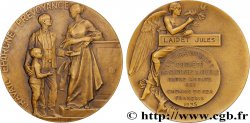正面
正面的文字 NAUTŒ SPES ET SALUS ; À L'EXERGUE : COMPAGNIE D'ASSURANCE DU HAVRE DE GRACE 1802.
正面的说明书 Un navire sombrant devant une forteresse. Le soleil au loin sur la mer.
正面的翻译 L'espoir et le salut pour le marin .
背面
背面的文字 EX PRUDENTIA SECURITAS ; À L'EXERGUE : CHAMBRE D'ASSURANCE DU HAVRE DE GRACE AN ONZE DE LA RE.
背面的说明书 Un trois-mâts sur les flots.
背面的翻译 De la prudence naît la sécurité.
评论
历史细节
INSURANCES
Under the Old Regime, insurance was above all maritime. It is a contract by which an individual undertakes to repair the losses linked to a shipwreck, for a certain sum which is paid to him in advance.. Thus, for example, we see that in the 18th century, in Bordeaux, maritime insurance was concentrated in the hands of a few large shipowners such as François Bonnaffé. An order of 1681 leaves the greatest freedom in the relationship between insurers and insured, hence the multiplication of players on the market. Still in Bordeaux, we then see the intervention of Parisian, Dutch and English companies. . . Non-maritime insurance became popular late (middle of the 18th century). They most often offer a guarantee against fire. Example: the general insurance company obtained the privilege of Louis XV in 1753 for the guarantee of maritime trade and to insure houses against fire. In the 19th century, we witness the emergence of countless companies, often specialized in very specific sectors, which will allow the development of the economy by pooling risks.. They are complemented by mutual associations and mutual aid.










 对产品描述纠错
对产品描述纠错 打印
打印 分享我的选择
分享我的选择 提问
提问 Consign / sell
Consign / sell
 产品介绍
产品介绍








